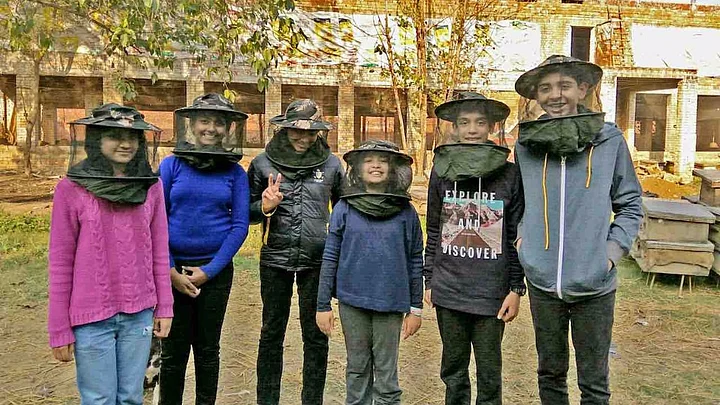Like any other girl her age, 12-year-old Kavya Vignesh likes to have fun when she is not studying. But unlike many others, she likes to make those moments memorable by creating something that helps solve some real-world problems.
Yes, you read that right. These days, she is busy putting finishing touches on a robot that has the potential to save honey bees in residential areas – and for making a presentation of her bot at an international robotics event to be held in Denmark next month.
Vignesh, a Class VII student of Delhi Public School, Vasant Kunj, is part of Supercalifragilisticexpialidocious – India’s youngest-ever team to qualify for the First Lego League – European Open championship in Aarhus, scheduled for May this year.
Using a combination of robotics and hi-tech components, Vignesh has developed a Bee Saver Bot that removes honey bees – the species primarily responsible for pollination and honey production around the world – safely and carefully without harming them or humans.
“I have been practising Robotics since I was nine. My aim in life is to use the power of robotics to solve some real-world problems,” Vignesh told IANS.
Over the past three years, she has won several robotics championships (Delhi Regional robotics championship 2015 and 2016) and is now excited about representing India in the forthcoming international competition.
The robot – Lightning McQueen – is made using Lego Mindstorms EV3, the third generation robotics kit in Lego’s Mindstorms line.
Here’s why Vignesh chose only honey bees.
We chose honey bees because they are mostly overlooked. Bees are mostly killed by us humans through pesticides, colony collapse disorder and many more ways.
“We learnt that more than 85 percent of the world’s crops are pollinated by honey bees. Every third bite of food comes from a bee-pollinated crop or animal that depends on bee pollination,” she emphasised.
In general, when people see a beehive near their houses and in parks and the like, they tend to call the pest controllers, who burn the hive, killing nearly 20,000 to 80,000 bees.
“So we thought of building a solution that can safely relocate the beehive without harming the bees,” Vignesh said.
The ‘Bee Saver Bot’ scans the beehive, and relocates it by building an enclosure that safely transports the beehive to the nearest bee farm, without harming any humans or bees.
“This solution can save millions of bees from getting hurt and actually relocate them back to bee farms from where they can be back on the fields where they contribute so much to our food chain,” the robotic champion noted.
(The article has been edited for length.)
Join The Quint on WhatsApp. Type “JOIN” and send to 9910181818.
(At The Quint, we question everything. Play an active role in shaping our journalism by becoming a member today.)
